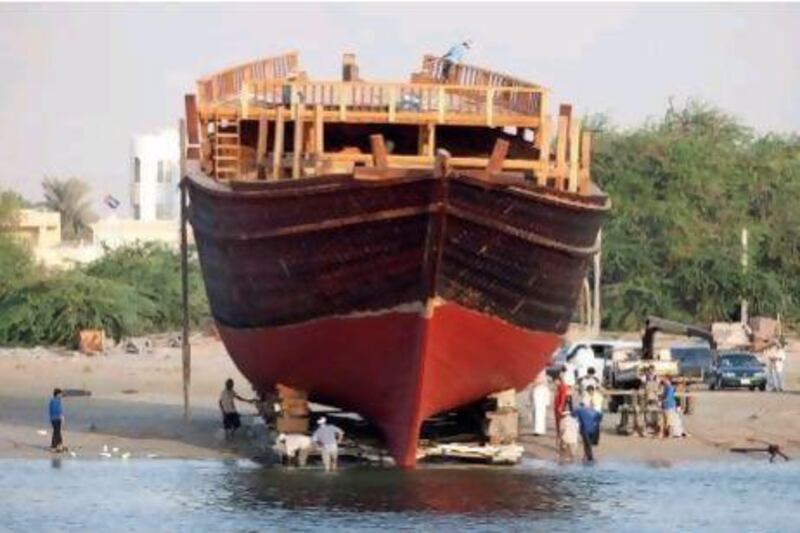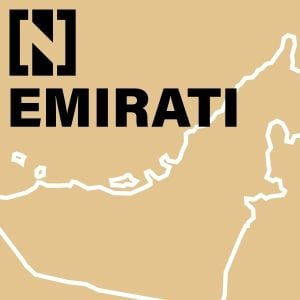RAS AL KHAIMAH // When Ras Al Khaimah’s last dhow launches today, it will be an event without ceremony watched only by a few family members, ageing sea captains and the South Indian crew who have worked here for almost 40 years.
For 10 years, the ageing dhow builder and retired sea captain Mohammed Bu Haji has pledged that each dhow he started would be his last.
But this time, he means it.
There is no wood left in his shipyard and the craftsmen are making retirement plans.
This launch has been a family affair, attended by a handful of expatriates, grandsons sipping cola and daughters watched from a car through tinted windows.
“It’s the last one because no one in my family is interested in that,” said Mr Bu Haji’s grandson, Rashid.
“It’s not like before. Everyone has a government job. Ten years before, people came here to see it and say, ‘Oh it’s nice’. But these days, no.”
The “small” dhow measures 30 metres long, seven metres tall and 10 metres across.
A team of nine men from South India worked on it for two years from beginning to end: they cut two dozen 10-metre African logs into planks and built them into a single ship without blueprints.
Its launch was another nod to tradition: 10 days of rolling the dhow forward on ironclad wooden rollers and planks using a capstan pulley system.
Even now, the men rely on Mr Bu Haji’s insight and 50 years of experience.
Hours were spent trying to attach the rudder on Saturday. When Mr Bu Haji arrived at 5pm, he pointed his finger a few times, gave some quick instructions in a seafarer’s mix of Hindi, Malayalam and Arabic, and had the rudder mounted in an hour.
“If anybody wants to learn I will teach them,” said Mr Bu Haji, 82.
This type of dhow is a boom – a deep ship built for carrying cargo. It will be fitted with a 540 horse power engine and will be sold for Dh2.1 million and used for trade.
“See, this is a very expensive hobby,” said Mr Bu Haji’s son Qassim, who lives in Dubai.
The family declined an early offer because they were uncertain of when, or if, it would be finished. “The problem is my father’s not here,” said Qassim, who worries about his father’s health.
Qassim and his brothers are almost superstitious about mentioning another dhow around their father. They fear he will reconsider retirement.
The crew, on the other hand, fears retirement. It is not economics but the separation.
“After living here for so many years, leaving and separating makes me very sad,” said Malekal Abdul Latif, the shipyard foreman who has worked at the yard for 37 years. “Because settling in India ... we have a roof over our heads but it troubles me somehow. Because of leaving my boss behind. He is a very decent man.”
Mr Abdul Latif lives and works on a sliver of beach that serves as Ras Al Khaimah’s last traditional dhow yard. He has built 10 to 25 “big dhows” – 800-tonne capacity monoliths that can carry cars as cargo– and countless smaller creations.
At Mr Bu Haji’s height as a dhow builder, he commanded 70 men and three cooks from Iran, India and Pakistan who worked on seven dhows at a time at a yard in Old RAK.
When Mr Abdul Latif arrived there were more than 45 men working at the dhow yard.
Most of the remaining nine-man crew have worked here for more than two decades. Their only concession to modernity in construction has been a band saw and a converted 1985 Mitzubishi Cantez fitted with a crane and a creative mechanical system.
“It’s an old vehicle,” said Mr Abdul Latif. “It’s like our boss. It still has good strength and power. Did you not see all the load it can still handle?”
Until this year, Mr Bu Haji was at the dhow yard almost every day. Now, he comes once a month.
“Just this last year he hasn’t been able to come frequently,” said Mr Abdul Latif. “Otherwise, be it morning or evening, he will be here with the workers, talking to them, because he was the engineer, foreman, boss, accountant – he was everything. He and I were the ones who handled all business these years. We didn’t have a foreman or even a driver. It was either him or me.”
Mr Bu Haji would not confirm that this would be his last dhow. He raised a finger and pointed to the skies. "Only God knows. He knows."
azacharias@thenational.ae






